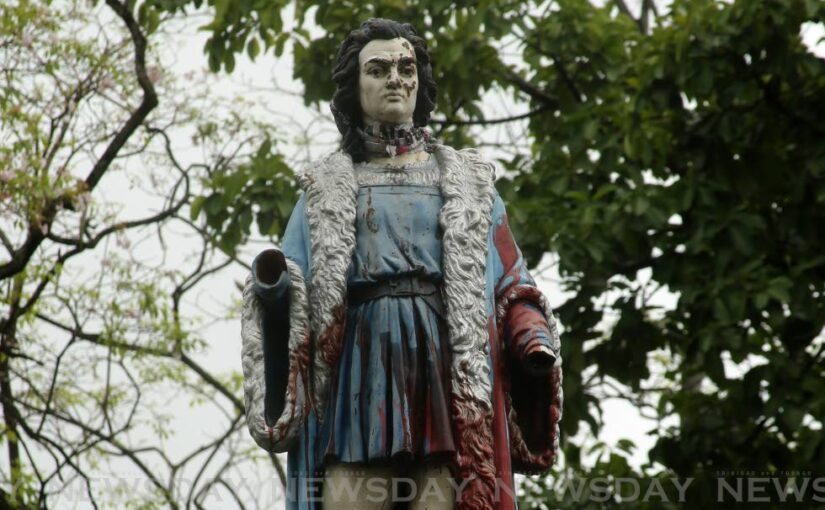During our recent ShakeOut drill, a number of people asked me about dam safety during earthquakes. I am not an earthquake engineer and by no means an...
Vous n'êtes pas connecté
- English
- Français
- عربي
- Español
- Deutsch
- Português
- русский язык
- Català
- Italiano
- Nederlands, Vlaams
- Norsk
- فارسی
- বাংলা
- اردو
- Azərbaycan dili
- Bahasa Indonesia
- Հայերեն
- Ελληνικά
- Bosanski jezik
- українська мова
- Íslenska
- Türkmen, Түркмен
- Türkçe
- Shqip
- Eesti keel
- magyar
- Қазақ тілі
- Kalaallisut ; kalaallit oqaasii
- Lietuvių kalba
- Latviešu valoda
- македонски јазик
- Монгол
- Bahasa Melayu ; بهاس ملايو
- ဗမာစာ
- Slovenščina
- тоҷикӣ ; toğikī ; تاجیکی
- ไทย
- O'zbek ; Ўзбек ; أۇزبېك
- Tiếng Việt
- ភាសាខ្មែរ
- རྫོང་ཁ
- Soomaaliga ; af Soomaali
Rubriques :
 Maroc - NEWSDAY.CO.TT - A la Une - 01/09/2024 07:53
Maroc - NEWSDAY.CO.TT - A la Une - 01/09/2024 07:53
Heat over monuments
THE debate over removing monuments to colonisers took a dark, aggressive turn during the session convened at Government Plaza, Port of Spain on August 28. The discourse devolved dramatically after one member of the audience attempted to shout down another, yelling at a woman, "I would ask you to go back to Africa." Clearly there are deep-seated sentiments at play here, even among a microcosm of less than 50 concerned citizens gathered in the auditorium. Fuelling much of this emotion are threads of learned history that may not have kept pace with the evolving understanding of Caribbean history and specifically what happened in our twin-island state. A legacy of sanitised history has led to widespread misunderstandings about the people immortalised in our inherited street names and statues and what they actually did to the indigenous, indentured and enslaved people who were our ancestors. An updated national reassessment of our colonial past is overdue. Until the turn of the century, the study of West Indian history offered a hero myth of Christopher Columbus as the discoverer and saviour of the Caribbean. This nancy story of the colonist as saviour of the indigenous people and deliverer of pagans into Christianity still persists. It wasn't until 2023 that the Doctrine of Discovery was formally repudiated by the Catholic church. That papal decree gave a religious underpinning to the bluntly economic exploitation that drove an exploration of the world in search of resources and the expansion of empire. Three key papal bulls, the first issued in 1452, were held as justification for murder, destruction, forced assimilation, rape and genocide by Spanish explorers. The Doctrine of Discovery was abrogated legally and nullified by the Vatican in the 1530s, but the idea lived on. The US Supreme Court used the idea in 1823 to declare that the indigenous people of the Americas only had rights of occupancy, not ownership of the lands they lived on. TT is part of a larger global reassessment of the messages sent by monuments to colonisers, dictators and outdated political movements. The US has had fierce discussions over Confederate monuments and memorials which lionise defenders of slavery. Colonial-era statues in African nations have been removed, though some have been returned, supported by coloniser-nation economic interests and neo-colonial movements. What's to be done with colonial-era monuments? Some statues have been returned to colonial metropoles. Others have been destroyed or defaced. The most sensible approach seems to be preserving and re-contextualising them. Arguments about cultural erasure gloss over the fact that these monuments erase indigenous cultural sites and history and always establish a presence that redirects historical contemplation to the coloniser's perspective. The discussion is important. The actions we take should be measured and effective. Emotion should be tempered by shared knowledge at every step in the process. The post Heat over monuments appeared first on Trinidad and Tobago Newsday.
Articles similaires
Historical context behind Trinidad and Tobago’s engagement with US, Venezuela
DARREN GARNER MUCH HAS been said about Prime Minister Kamla Persad-Bissessar’s position regarding TT’s involvement in regional security matters...
Historical context behind Trinidad and Tobago’s engagement with US, Venezuela
DARREN GARNER MUCH HAS been said about Prime Minister Kamla Persad-Bissessar’s position regarding TT’s involvement in regional security matters...
Trump and MAGA's true driving force is now on full display — and it's chilling
As we look forward to seeing the effect of the “No Kings” protests, I think it’s important to bring forward the theological nature of what...
Calypso History Month: Telling our stories through calypso
NASSER KHAN In these troubled times, among the few remaining and enduring threads that hold us together are the boundless harmonies of the calypso...
These radical steps are essential now — or Trump will crush any resistance
The No Kings Day protests last weekend were breathtaking. Seven million or more Americans filled streets, explicitly condemning the way Trump has been...
These confederate statues caused US protests. Knocked down, they're the centre of a new art show
The 18 decommissioned Confederate monuments have been deconstructed and displayed to make a statement on the horrors of slavery.
Rosa Parks and Helen Keller statues unveiled at the Alabama Capitol
Statues of Rosa Parks and Helen Keller, pivotal figures who fought for justice and inspired change across the world, were unveiled Friday on the...
'A Trump statue?' Senator fears Lincoln Memorial could be target after White House rebuild
WASHINGTON — Some Democrats don’t think it’s a coincidence that President Donald Trump ordered the razing of the East Wing of the White House in...
'A Trump statue?' Senator fears Lincoln Memorial could be target after White House rebuild
WASHINGTON — Some Democrats don’t think it’s a coincidence that President Donald Trump ordered the razing of the East Wing of the White House in...
Les derniers communiqués
-
Aucun élément





